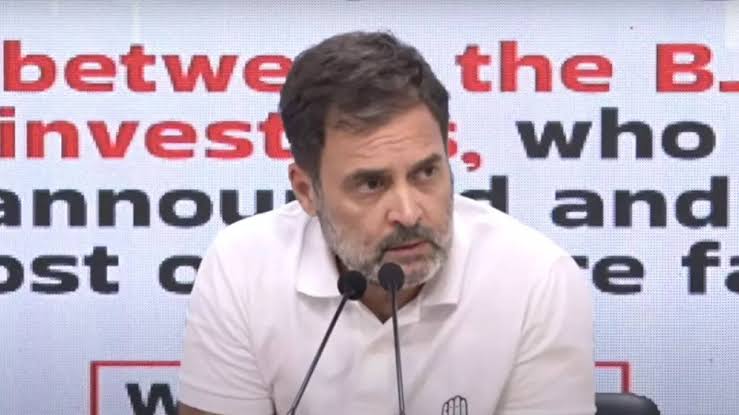Add your promotional text...
Rahul Gandhi Accuses Modi and Shah of Market Manipulation: Calls for ₹30 Lakh Crore Investor Loss Probe
SYNOPSIS:- Congress leader Rahul Gandhi has accused PM Narendra Modi and Home Minister Amit Shah of a stock market scam that caused ₹30 lakh crore in investor losses. He claims their election period investment advice led to massive market fluctuations and demands a Joint Parliamentary Committee (JPC) probe. Gandhi highlights the unusual coordination of statements by high-ranking officials and questions the ethicality of their investment tips. The alleged manipulation has raised concerns about the integrity of financial markets and the role of government officials in influencing them.
TOP STORIES
By Divya Chaudhary
6/7/20242 min read


In a recent statement, Congress leader Rahul Gandhi has accused Prime Minister Narendra Modi and Home Minister Amit Shah of orchestrating a stock market scam, resulting in a massive ₹30 lakh crore loss for investors. He is calling for a Joint Parliamentary Committee (JPC) to investigate the issue thoroughly.
Controversial Market Advice
Rahul Gandhi highlighted that during the election period, high-ranking officials, including the Prime Minister, Union Home Minister, and Finance Minister, made unprecedented comments on the stock market. According to Gandhi, PM Modi and Amit Shah encouraged investors to buy stocks before June 4, citing anticipated market gains. On May 19, PM Modi predicted record-breaking market performance for June 4, an assertion echoed by Home Minister Shah, who advised purchasing shares before the said date.
Gandhi remarked, “Retail investors lost ₹30 lakh crore, marking this as the biggest stock market scam in history.”
Call for Accountability
Gandhi questioned the propriety of government officials providing specific investment advice, highlighting the unusual coordination between their statements and the involvement of media owned by a business group under SEBI investigation. He emphasized the need to investigate the possible collusion between BJP, questionable exit pollsters, and foreign investors who profited massively from this advice, which adversely impacted retail investors.
He stated, “Why did PM Modi and Union Home Minister give specific investment advice to the five crore families investing in the stock market? Is it their job to give investment advice? Why were both interviews given to the same media owned by the same business group, which is also under SEBI investigation for manipulating stock?”
Gandhi called for a JPC probe, convinced that this incident reflects a larger scam where significant profits were made at the expense of ordinary investors due to insider advice allegedly given by top government officials.
Election Results and Political Implications
The 2024 Lok Sabha election results, announced on June 4, saw the BJP securing 240 seats, a significant drop from its 2019 tally of 303. In contrast, the Congress party made notable gains, winning 99 seats, while the INDIA bloc crossed the 230 mark, presenting a strong challenge to BJP and defying previous predictions.
Despite these results, Prime Minister Narendra Modi has secured a third term. However, the BJP will now need to rely on its coalition partners, such as JD(U) led by Nitish Kumar and Chandrababu Naidu’s TDP, to form a stable government. This marks the first time since 2014 that the BJP has not secured a majority on its own, falling 32 seats short of the 272 majority mark.
The Road Ahead
As the political landscape shifts, the call for a JPC probe into the alleged stock market manipulation is expected to intensify. Gandhi’s accusations have raised critical questions about the ethical responsibilities of government officials and the transparency of their interactions with the stock market and media.
Investors, policymakers, and the general public will be closely monitoring how this issue unfolds, particularly the potential impact of a JPC investigation on political and financial stability in India. The outcomes of such an investigation could have far-reaching implications for the credibility of financial markets and the accountability of government actions in the country.
This unfolding saga not only highlights significant political drama but also underscores the vital need for vigilance and regulatory oversight in safeguarding the interests of millions of retail investors in India.
